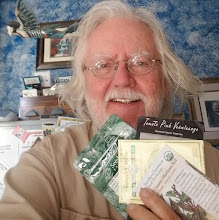There
is a column making its way through my friends on Facebook declaring
vinegar to be a 'safe pesticide.' I dislike the term 'safe
pesticide' as it is often nothing more than an oxymoron.
The
suffix of '-cide' is taken from Latin meaning 'to cut down,
kill.' The more genericterms pesticide or biocide include more specific killers,
like herbicide (weed killers), insecticides (specifically insect
killers), fungicides and a bunch of others.
A
compound doesn't get to be called a '-cide' unless it kills
something, so the idea of a 'safe' pesticide is relative – 'safe'
for whom? Obviously, it's not 'safe' for the thing it kills. And, in our chemical soup world, many folks seem to have become accepting that it's quite alright to eat food that is deadly for some species to eat. But the concept of a 'safe' pesticides tugs at a conscious mind as something beyond reason.
At
a recent panel discussion for gardeners in Santa Monica, I was
horrified to hear an organic farmer promoting the use of nicotine as
a general insecticide. His first offering was to a woman who wanted
to rid her milkweed of aphids. She was growing the milkweed to
promote monarch butterfly populations. As one who is called 'post-modern organic,' I was flabbergasted that she
was even thinking of an insecticide at all! After all, if she's
hoping to give the plant up to an insect, why would she be disturbed
if a few aphids got in on the act? Her indignation towards me was very hostile as she vehemently declaring he aphids were killing her plants. (In her defense, I was tired and hungry and when I'm tired and hungry, my diplomacy can be, um, 'challenged.')
Even rested and well-fed, call
me naïve, but I think she's crazy. A plant that gets attacked by
aphids is a weak plant to begin with - we can think of aphids as
being Mother Nature's way of taking a plant out of the gene pool
because it's not a good contender for passing on genetic material.
So, if aphids kill her plants, I would postulate the plant was too
weak to begin with. Still, why she has aphids does not beg the question as to
why she wants to use a pesticide to kill them, but of course, I'm the
one who thinks spraying a plant with poison so it will live long
enough for human consumption is nuts. And what kind of blinders does a person wear who can't figure why anything
that kills aphids wouldn't also kill the Monarchs? It continues to flabbergast me.
All
that aside, the final straw is that nicotine will kill EVERYTHING it
touches as long as it's wet. It will kill the aphids. It will kill
the Monarchs in all stages of their growth. It will kill honey bees
and it will kill things in the soil if it is applied properly
(pesticides are to be applied to the 'drip point' – this is standard
practice and it means you spray until the solution begins to drip off the plant) and
all those drippings fall into the soil and continue to kill until
they are sufficiently diluted. This part of pesticide application is
never talked about and we act as though it doesn't happen. But it
does happen whether or not we study it.
So now to this 'safe' pesticide of vinegar. Safe?
First of all, do not buy the hype. If it kills, it has a drawback,
somewhere, somehow. And before I can say it's safe, I want to know
what that drawback is because I don't want to have a surprise later
on. Vinegar's main method of killing is by changing the pH to deadly levels for organisms - plants and or fauna depending on how it's used.
Vinegar, just like nicotine, will kill or
damage whatever it touches as long as it is still moist, still very acidic.
I was very
excited about vinegar about four years ago, using it as an
herbicide on a noxious weed, False Garlic, Nothoscordum
bivalve.
False Garlic is a particular evil weed. The little white flowers
dispense copious amounts of bubils, baby bulbs. They sprout on the
surface of the soil. As the little leaves begin to reach skyward,
the root springs out and begins to pull the plant under the soil.
The more leaves on the surface, the deeper that bulb has been pulled under
ground and, worse yet, the more baby bulbs have formed around it. When a gardener removes this plant at this stage, it might well be essential to remove close to
a square foot of soil as well in order to insure none of
the baby bulbs are left behind to torment you.
 |
| Nothoscordum bivalve, False Garlic |
As
an aside, False Garlic is obviously a member of the
Lily family by the way it looks, like onions and true garlic. Apart from no edible bulb, the giveaway on a
mature plant is that it smells like a spoiled garlic - it doesn't smell yummy. It stinks.
Seizing upon the lie of a 'safe' herbicide, I elected to use vinegar on this difficult plant. I was pouring
one to two cups of vinegar per plant because this species has a waxy
covering which prevents the uptake of vinegar by most cells. It was
necessary to get enough vinegar to percolate deep enough into the
soil with enough strength to find the roots where there would be a
better chance of being absorbed by the plant. I was having some success. But one day, as soon as I poured the vinegar onto a plant, two
earthworms came up out of the ground writhing to their deaths in
front of me. That's when I realized that the term 'safe' pesticide
meant safe for me, but not for other creatures. It's also when I
formulated my idea that pesticides always have unintended
consequences.
It
is my intention that humans begin to look at all the different
'-cides' with more scrutiny. While we still do battle with perennial weeds that frustrate most of my attempts to get them gone,we have been able to achieve zero
insecticide usage at The Learning Garden by having something in bloom
throughout the growing season – and we often leave some of each
crop to flower to help with that. Those flowers are often allowed to
go to seed because we save seeds here as well. But in addition, no
vegetable garden should be grown without some flowers
blooming nearby. We also have several spots where we grow California
Native plants to encourage more insects.
The truth of the matter, the way to really defeat insects, is to invite more insects into the garden rather than try to kill off the ones you don’t like.
The truth of the matter, the way to really defeat insects, is to invite more insects into the garden rather than try to kill off the ones you don’t like.
Our
program to create an environment that encourages beneficial insects
to make our garden their home, includes:
- No insecticides what so ever.
- Something in bloom all through the growing season.
- Provide water for insects.
- Willingness to allow plants to suffer some cosmetic damage.
- Willingness to let some plants die if they get overwhelmed by insects.
I
urge you to consider these options and allow other creatures to co-exist peacefully in your garden - if beneficial insects make your garden their home, you will have a balance in your garden that makes it healthier for you as you avoid all forms of '-cides' that may have harmful effects we failed to realize.
And I continue to work on getting rid of False Garlic in a more efficient manner that doesn't kill off any of my earthworms.
david







.jpg)